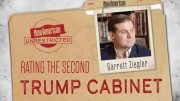
Two far-left lawyers appear to be pushing Congress to stage a rebellion or insurrection against President-elect Donald Trump.
Writing for The Hill, Evan Davis and David Schulte argue that Trump himself staged such a rebellion or insurrection against the Constitution in 2020, despite no court convicting him of such a crime. Thus, Congress needn’t validate November 5’s electoral vote that will send him back to the White House.
The far-fetched plan would do exactly what the lawyers falsely accuse Trump of doing in 2020: refuse to accept the election. And they add a proposal — behind the fig leaf of the Constitution — to install a losing candidate in the White House.
The Plan
“The Constitution provides that an oath-breaking insurrectionist is ineligible to be president,” the two pettifoggers begin:
This is the plain wording of Section 3 of the 14th Amendment to the Constitution. “No person shall … hold any office, civil or military, under the United States, or under any state, who, having previously taken an oath … to support the Constitution of the United States, shall have engaged in insurrection or rebellion against the same, or given aid or comfort to the enemies thereof.” This disability can be removed by a two-thirds vote in each House.
Disqualification is based on insurrection against the Constitution and not the government. The evidence of Donald Trump’s engaging in such insurrection is overwhelming. The matter has been decided in three separate forums, two of which were fully contested with the active participation of Trump’s counsel.
In fact, the evidence is not “overwhelming,” and for good reason. But at any rate, the lawyers claim that Trump is guilty of insurrection on three grounds.
First, during the U.S. Senate’s trial of Trump’s second impeachment by the House of Representatives, seven renegade Republicans voted to convict Trump of “incitement of insurrection,” even if the Senate failed to expel Trump from office. Therefore, they say, Trump “‘engaged in insurrection’ against the Constitution,” which means Congress can refuse to certify his victory.
Second, Trump “engaged in insurrection” because the Colorado Supreme Court said so and cited “clear and convincing evidence” to disqualify Trump from the state’s presidential ballot. However, the U.S. Supreme Court ruled that states “lack power to disqualify candidates for federal office and that federal legislation was required to enforce Section 3. The court did not address the finding that Trump had engaged in insurrection.”
Last, the lawyers cite the dubious and corrupt House select committee that probed the so-called insurrection at the U.S. Capitol on January 6, 2021:
More than half of the witnesses whose testimony was displayed at its nine public hearings were Republicans, including members of the Trump administration. The inescapable conclusion of this evidence is that Trump engaged in insurrection against the Constitution. In particular, Trump unlawfully demanded that his vice president, Mike Pence, throw out votes in the Electoral College for political opponent Joe Biden, a power he did not have. While the riot was in progress, Trump used Pence’s rejection of his demand to further enflame the crowd and cause them to chant “Hang Mike Pence!”
In fact, Trump never encouraged anyone to chant “Hang Mike Pence!” In its probe of the January 6 Select Committee, the House Oversight committee found that “there is no evidence that President Trump agreed with rioters chanting ‘hang Mike Pence.’”
January 6 Committee
As well, as The New American reported last week, the committee report disclosed that
evidence uncovered by the Subcommittee revealed that former Congresswoman Liz Cheney tampered with at least one witness, Cassidy Hutchinson, by secretly communicating with Hutchinson without Hutchinson’s attorney’s knowledge. This secret communication with a witness is improper and likely violates 18 U.S.C. 1512. Such action is outside the due functioning of the legislative process and therefore not protected by the Speech and Debate clause.
The report reproduced Cheney’s text messages with Hutchinson, a key witness before the January 6 Committee. The report alleges that Cheney suborned perjury from Hutchinson. Hutchinson, it alleges, repeatedly lied to the committee about key events that day.
And, the Oversight panel found, “President Trump did not have intelligence indicating violence on the morning of January 6.”
So the January 6 Committee’s claims are dubious at best, and tainted at the least.
Nor is it clear that Trump’s urging Pence to reject the electoral vote was “unlawful.” As former Justice Department attorney John Yoo explained in 2022, the Electoral Count Act’s rules for settling the Electoral College vote are unclear and confusing, and indeed, “understate the vice president’s role.”
Ignore SCOTUS
Davis and Schulte also argue, in so many words, that Congress can ignore the SCOTUS majority’s “suggestion that there must be new implementing federal legislation passed pursuant to the enforcement power specified in the 14th Amendment.”
“Counting the Electoral College votes is a matter uniquely assigned to Congress by the Constitution,” they continue. “Under well-settled law this fact deprives the Supreme Court of a voice in the matter, because the rejection of the vote on constitutionally specified grounds is a nonreviewable political question.”
Congress can reject the electoral vote because the “vote of one or more electors was not ‘regularly given,’” they concluded:
A vote for a candidate disqualified by the Constitution is plainly in accordance with the normal use of words “not regularly given.” Disqualification for engaging in insurrection is no different from disqualification based on other constitutional requirements such as age, citizenship from birth and 14 years’ residency in the United States.
To make an objection under the Count Act requires a petition signed by 20 percent of the members of each House. If the objection is sustained by majority vote in each house, the vote is not counted and the number of votes required to be elected is reduced by the number of disqualified votes. If all votes for Trump were not counted, Kamala Harris would be elected president.
Democrats, the two argue,
need to take a stand against Electoral College votes for a person disqualified by the Constitution from holding office unless and until this disability is removed. No less is required by their oath to support and defend the Constitution.
There is a problem with this plan. Trump did not “engage in rebellion or insurrection” on January 6, 2021, so he is not “disqualified by the Constitution.”
And indeed, the two lawyers argue exactly what Trump and his protesting supporters at the Capitol argued for in pushing Congress not to certify on January 6, 2021 President Joe Biden’s suspicious victory: “No less is required” by the oath of congressmen “to support and defend the Constitution.”



